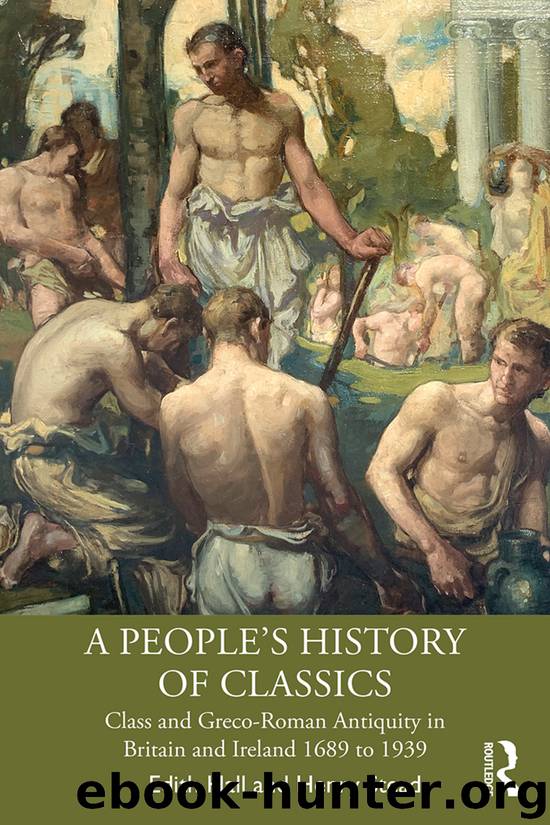A People's History of Classics by Hall Edith; Stead Henry;

Author:Hall, Edith; Stead, Henry;
Language: eng
Format: epub
Publisher: Taylor & Francis Group
Greeklessness, race, gender and class
In a collection of essays, Grose remarks that ‘Greek is almost as rare among military people as money’.22 The same could be said in the 18th century of many more middle- and upper-class men than would have cared to admit it. The result was that Greek acquired a totem-like status, and often appeared in rhetorical situations where exclusion from not only polite society but even fundamental rights as a human being were at stake; for example, when white people wanted to distinguish their intellectual abilities from those of black ones. An African American named Alexander Crummell travelled to Cambridge University and learned Greek during his theological studies at Queen’s College (1851–1853), financed by Abolitionists. He later said that he had partly been motivated by a conversation he heard as a free but impoverished errand boy in Washington DC in 1833 or 1834, when pro-slavery thinkers were on the defensive. The Senator for South Carolina, John C. Calhoun, declared at a dinner party that only when he could ‘find a Negro who knew the Greek syntax’ could he be brought to ‘believe that the Negro was a human being and should be treated as a man’.23
The author of a Cornwall/Devon newspaper article, written in 1852, sneers at what he sees as do-gooders with cranky views on education, the sort of ‘educated man who believes that an ignorant servant, who cannot with both her eyes read “slut” visibly written on a dusty table, can … read a Greek chorus with her elbows’.24 The rhetorical effect here comes from the manifest absurdity of imagining that a working-class female could achieve the educational standard symbolised by reading Greek lyric verse. The point depends on extreme class snobbery as well as misogyny: the serving girl’s brain can never be developed (the body part mentioned is her elbows, symbol of manual labour). She is only by a syntactical hairsbreadth not dismissed as sexually depraved as well as educationally retarded.25
Of all forms of Greek, the words of the Greek tragic chorus seemed the most potent symbol of the elitist class connotations of the classical curriculum. For Victorians, the chorus symbolised esoteric intellectual matters, as people today talk about ‘rocket science’ or ‘brain surgery’. In the polemics of educational reformers, such as those who established the College of Physical Science at Newcastle-upon-Tyne in 1871, the metres of the Greek chorus become the emblem of ‘useless’ education for its own sake. In 1871 a Yorkshire advocate of reformed, utilitarian and science-based education wrote an article in The Huddersfield Chronicle and West Yorkshire Advertiser entitled ‘Useful versus Ornamental Learning’: he said,
Many men brought up in the strict traditions of academical learning will look with eyes of scorn upon the new College of Physical Science, just opened in Newcastle-upon-Tyne … How can a nation prosper, will old college Dons think, whose sons let their wits go wool-gathering after chemistry and natural philosophy, when they ought to be hard at work unravelling the intricacies of a Greek chorus,
Download
This site does not store any files on its server. We only index and link to content provided by other sites. Please contact the content providers to delete copyright contents if any and email us, we'll remove relevant links or contents immediately.
| Africa | Americas |
| Arctic & Antarctica | Asia |
| Australia & Oceania | Europe |
| Middle East | Russia |
| United States | World |
| Ancient Civilizations | Military |
| Historical Study & Educational Resources |
Mythos (2019 Re-Issue) by Stephen Fry(1565)
Alexander the Great by Robin Lane Fox(1357)
On Sparta (Penguin Classics) by Plutarch(1188)
Antigone Rising: The Subversive Power of the Ancient Myths by Helen Morales(1134)
Persian Fire by Tom Holland(1079)
The Last Days of Socrates by Plato & Christopher Rowe & Plato(1007)
The Classical World: An Epic History From Homer to Hadrian by Robin Lane Fox(991)
Cicero by Anthony Everitt(987)
The Athenian Constitution (Classics) by Aristotle(940)
Antigone Rising by Helen Morales(841)
The Greek World(815)
The Riddle of the Labyrinth(814)
The Story of the Greeks (Yesterday's Classics) by Guerber H. A(782)
The Homeric Hymns (Penguin Classics) by Homer(752)
The End of the Bronze Age by Robert Drews;(744)
The Eudemian Ethics (Oxford World's Classics) by Kenny Anthony(739)
Guide to Greece by Pausanias(725)
Lords of the Sea: The Epic Story of the Athenian Navy and the Birth of Democracy by John R. Hale(701)
A History of My Times (Classics) by Xenophon(692)
